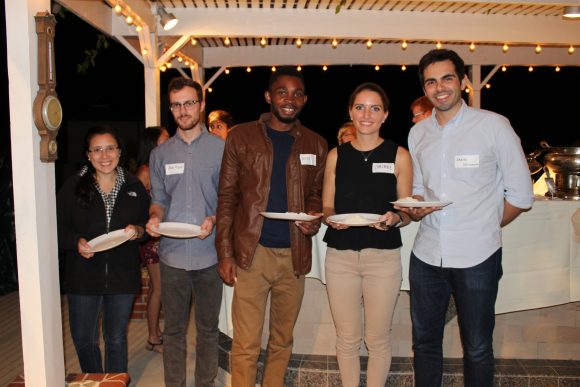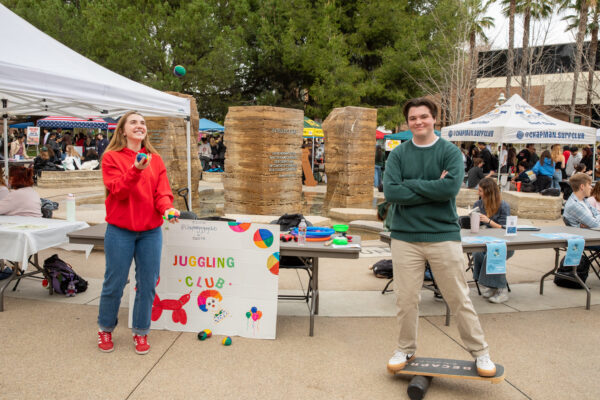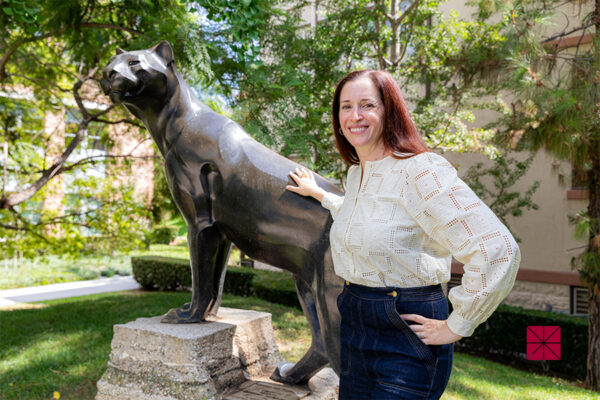Everyone’s definition of comfort food varies – a traditional stew, a certain rice dish, a special sweet — but a warm welcome translates in any language. Chapman University is home away from home to more than 500 international students from 66 countries, and about 60 new and returning students from around the world gathered at the home of Bicky and Gurpreet Singh in Orange on Oct. 7 for a party that has become a yearly tradition.

Students Betzy Sandoval fall of ’16 and (MA ’17) (Guatemala), Oliver Engist ’17 (Switzerland), Chinweike Ezike fall ’16 (Nigeria), Corinne Burla ’17 (Switzerland) and Daniel Drummond ’14 and (MA ’17) (Brazil) at the annual welcome dinner hosted by Bicky and Gurpreet Singh.
“The dinner was one of my best nights in Orange,” said Ragini Bhasin (MFA ’19), a student from India. “It was very kind and generous of them to host a dinner for students. We were very warmly welcomed, and being a Punjabi I know that they served the best and personally my favorite food. The butter chicken especially was mouth-watering. Thank you so much for having us and treating us like your children.”
Others likewise extended their thanks to the Singhs, generous friends of Chapman who arrived in this country from India as students and are the parents of Anupreet Singh, a 2016 graduate of Chapman’s
Argyros School of Business and Economics.
The Singhs’ involvement with Chapman is reflected in the annual
Sikhlens festival celebrating Sikh films and arts that will be presented Nov. 17-20 by the Dodge College of Film and Media Arts, as well as the couple’s collaboration with the Leatherby Libraries and the Fish Interfaith Center on other initiatives.
Speaking before a dinner gathering that included not only students but faculty, deans and other administrators, Leatherby Dean Charlene Baldwin noted three major campus exhibitions about Sikh Indian history that are currently in the special collections library. The upcoming Dr. Bhagat Singh Thind Archives exhibition opens Nov. 17 in the Doy and Dee Henley Reading Room in the Leatherby Libraries.
International students have a champion in the President’s Office at Chapman: Daniele C. Struppa, Ph.D., inaugurated as the school’s 13th president last month, came to the U.S. from Italy to earn his doctorate in mathematics at the University of Maryland, College Park. He wrote last year in the
Orange County Register of both the opportunity and anxiety international students encounter, as well as the richness they bring to campus in their languages, religious traditions and social customs.
“Chapman becomes therefore a microcosm of the American society, where people from different cultures come together, learning and sharing, becoming American, yet never forgetting their roots,” Struppa wrote.
Chinweike Ezike (LL.M. ’17), a student from Nigeria who attended last month’s welcome party, called the dinner “an awesome experience” that provided fellowship with other international students.
“We were excited and talked free about our countries,” Ezike said “I was happy to learn from them and to make new friends.”
Display image above: Mrithula Arunkumar (MBA/MFA ’19), a student from India, with host Gurpreet Singh.





This is most positive because being an international student isn’t easy, given our complex culture and language. Assistance must come from numerous sources to aid these young people embarking on life’s journey. Most struggle in their efforts and need guidance from schools’ international departments, immigration protection, host families, concerned neighbors and fellow students, and even informative books to extend a cultural helping hand so we all have a win-win situation.
One such new award-winning worldwide book/ebook that reaches out to help anyone coming to the US is “What Foreigners Need To Know About America From A To Z: How to Understand Crazy American Culture, People, Government, Business, Language and More.” It is used in foreign Fulbright student programs and endorsed worldwide by ambassadors, educators, and editors. It also identifies “foreigners” who became successful in the US and how they’ve contributed to our society, including students.
A chapter on education explains how to be accepted to an American university and cope with a confusing new culture, friendship process and daunting classroom differences. Some stay after graduation. It has chapters that explain how US businesses operate and how to get a job (which differs from most countries), a must for those who want to work with/for an American firm here or overseas.
It also has chapters that identify the most common English grammar and speech problems foreigners have and tips for easily overcoming them, the number one stumbling block they say they have to succeeding here.
Good luck to all at Chapman or wherever you study!